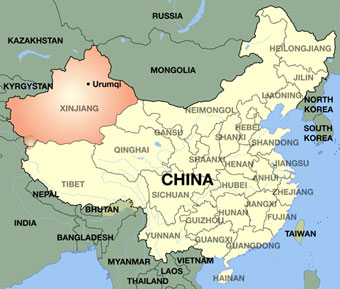Remote location and complex geology remain obstacles
The Chinese government announced yesterday that it will open six oil and gas blocks for private companies to explore in the Xinjiang region in northwest China. China’s Ministry of Land and Resources said that it hoped the move would “stir up market vigor.” However, obstacles still remain, according to Neil Beveridge, an analyst at Bernstein Research, in an interview with The Wall Street Journal.
The news is “certainly a good thing, but probably not a game-changer,” said Beveridge. How much excitement the blocks actually stir up will depend largely on the quality of their reserves, but the remote location and complex geology of the Xinjiang region adds a degree of difficulty.
 In its statement, the resource ministry explained that participating companies must have at least 1 billion Yuan ($161 million) in net assets in order to be considered, effectively excluding any smaller companies from bidding on the blocks.
In its statement, the resource ministry explained that participating companies must have at least 1 billion Yuan ($161 million) in net assets in order to be considered, effectively excluding any smaller companies from bidding on the blocks.
The Chinese government’s decision to allow private companies to explore oil and gas resources is one of the steps the country is taking in order to reform its oil and gas industry, which has long been dominated by state-owned companies like Chinese National Petroleum Corp. and Sinopec (ticker: SNP). Reform has been slow however, and recent uncertainties over the Chinese stock market may have investors weary of entering China’s oil and gas industry.
$564.6 billion in capital lost since mid-June
“Market confidence has collapsed,” Shen Jun, a strategist at BOC International Holdings Ltd., the investment-banking unit of state-owned Bank of China, told The Wall Street Journal. Risks are growing that the stock-market crisis will “evolve into a financial crisis.”
Chinese regulators took a number of steps this week to soften the blow of a stock market drop that has lost more than 3.5 trillion Yuan ($564.6 billion) in market value since a mid-June high, representing one-third of total capitalization.
Wednesday night, China’s securities regulator said controlling shareholders and executives who own more than 5% of a company’s stock are not allowed to sell their holdings for the next six months, adding to a number of previously announced regulations. The agency that oversees China’s oil giants and other state enterprises already forbid them from selling their shareholdings.
At the root of the latest market swing is the rapid expansion of loans by investors to buy shares. The so-called margin financing soared over the past year to about 2 trillion Yuan (about $320 billion) last month, according to official data.







